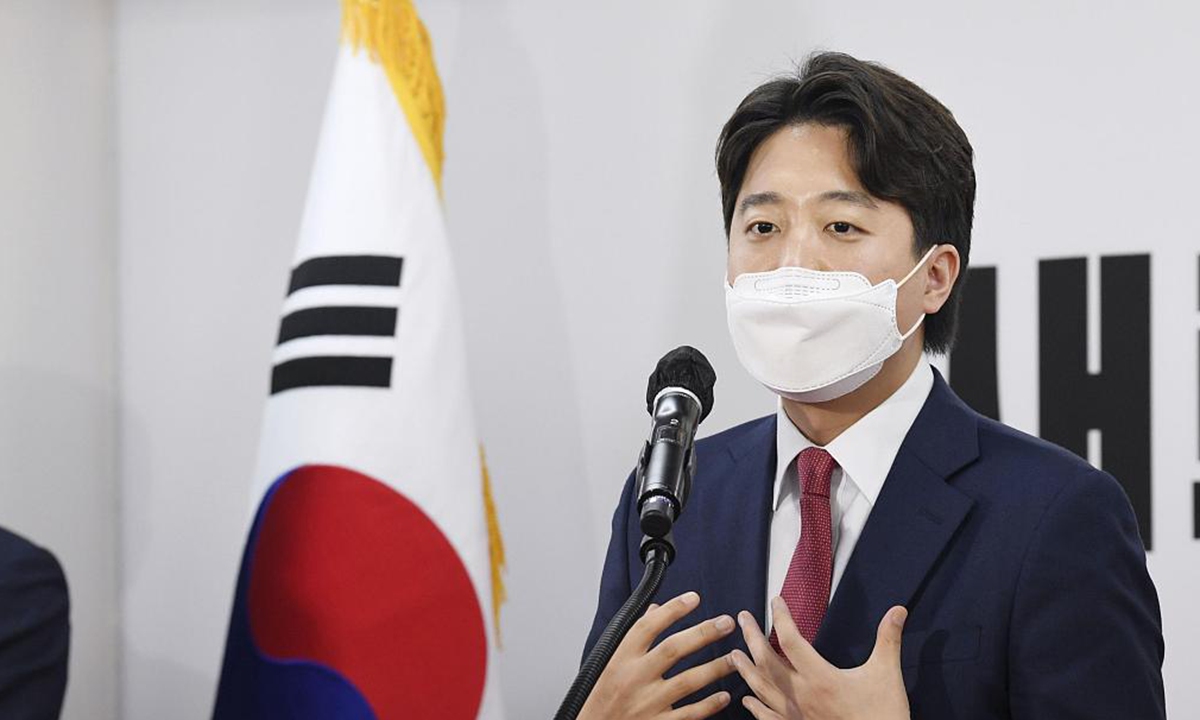SK 'rookie' party leader takes tough line on China to seek support, political influence: experts

Lee Jun-seok,leader of South Korea’s People Power Party photo:VCG
In stark contrast to South Korean President Moon Jae-in who has taken a rational approach toward China, the newly appointed leader of the country’s biggest opposition party Lee Jun-seok walked a tough line over Hong Kong matters in an interview with Bloomberg.
Analysts said Lee’s remarks could be seen as an attempt to draw attention to the expansion of his party’s political influence and to challenge the incumbent administration, by taking advantage of nationalist sentiments and democratic narratives among the South Korean public.
They warned young politicians like Lee not to take on radical ideological stances as their playground at the cost of sabotaging South Korea’s relations with China.
The 36-year-old leader of South Korea’s People Power Party said in an interview with Bloomberg that his fellow millennials will push back against Chinese “cruelty” in places like Hong Kong, implying a tougher stance toward China if his political group regains power.
Lee added that generational change is taking place and he aims to harness it to return his conservative group to the presidency at home, and to revisit Seoul’s relations with the international community globally.
In the Bloomberg interview on Friday, Lee, the youngest leader of any major political party in South Korean history, compared Hong Kong’s social turmoil in 2019 with South Korea’s democratic campaign in the 1980s, and said, “We’re definitely going to have to fight against the enemies of democracy,” while criticizing Moon Jae-in’s “gentle approach” on the issues of Hong Kong and Xinjiang.
The People Power Party issued a statement on Monday, stressing that Lee’s claims to “fight against the enemies of democracy” was not intended as an action against China. On the same day, Bloomberg also stated that Lee never used the word “anti-China” in his interview.
His radical remarks, however, are regarded by experts as an attempt to attack the incumbent administration, gain political power and seek the public’s attention in order to draw support for the party’s next presidential election.
“Lee is a ‘rookie’ in politics with very little knowledge on the affairs of China or other countries, and he is an ‘internet celebrity’ intended to change people’s views on the party which has always been ruled by seniors,” Zheng Jiyong, director of the Center for Korean Studies at Fudan University in Shanghai, told the Global Times on Monday.
Lee was elected the new chairman of the People Power Party on June 11, securing 43.8 percent of the ballots cast by party members and private citizens, defeating four established senior rivals in the party, including two high-profile former party floor leaders, according to the Korea Times.
The win came as a surprise for politicians within the country and in the international community, as Lee, a graduate of Harvard University and the startup founder of an education smartphone app, had never held office before, media reported.
Lü Chao, an expert on the Korean Peninsula issue with the Liaoning Academy of Social Sciences, told the Global Times on Monday that Lee’s stances reflect his intention to lean toward the US to gain support for his party in the next presidential election. “Faced with a complex global political environment, Seoul has been forced by the White House to take sides between the US and China,” he remarked.
By using rhetoric of “democracy” in attacking China’s internal affairs, Lee is taking advantage of South Korea people’s nationalist sentiments to gain support, observers noted, which have been fueled by the mounting disputes over culture in recent years.
As more parties in South Korea are desperately in need of getting rid of their “old man politics” image, more young politicians will join forces in the future, Zheng noted, where radical ideological stances like Lee’s are likely to become their playground.
However, experts believe that Lee’s chance of replacing Moon Jae-in in a future presidential election is very slim. What’s more, the South Korean constitution requires candidates to be at least 40 to run for president, and Lee is too young for the next election.
Although the individual remarks would not greatly harm bilateral ties, observers warned South Korea that such emerging narratives may sabotage its relations with China.
